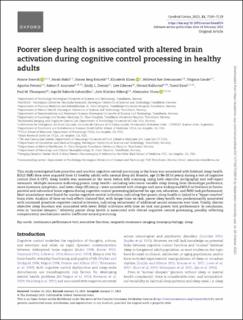| dc.contributor.author | Smevik, Hanne | |
| dc.contributor.author | Habli, Sarah | |
| dc.contributor.author | Saksvik, Simen Berg | |
| dc.contributor.author | Kliem, Elisabeth | |
| dc.contributor.author | Evensmoen, Hallvard Røe | |
| dc.contributor.author | Conde, Virginia | |
| dc.contributor.author | Petroni, Agustin | |
| dc.contributor.author | Asarnow, Robert F. | |
| dc.contributor.author | Dennis, Emily L. | |
| dc.contributor.author | Eikenes, Live | |
| dc.contributor.author | Kallestad, Håvard | |
| dc.contributor.author | Sand, Trond Halfdan | |
| dc.contributor.author | Thompson, Paul M. | |
| dc.contributor.author | Saksvik-Lehouillier, Ingvild | |
| dc.contributor.author | Håberg, Asta | |
| dc.contributor.author | Olsen, Alexander | |
| dc.date.accessioned | 2023-10-30T08:35:45Z | |
| dc.date.available | 2023-10-30T08:35:45Z | |
| dc.date.created | 2023-06-16T08:40:02Z | |
| dc.date.issued | 2023 | |
| dc.identifier.citation | Cerebral Cortex. 2023, 33 (11), 7100-7119. | en_US |
| dc.identifier.issn | 1047-3211 | |
| dc.identifier.uri | https://hdl.handle.net/11250/3099295 | |
| dc.description.abstract | This study investigated how proactive and reactive cognitive control processing in the brain was associated with habitual sleep health. BOLD fMRI data were acquired from 81 healthy adults with normal sleep (41 females, age 20.96–39.58 years) during a test of cognitive control (Not-X-CPT). Sleep health was assessed in the week before MRI scanning, using both objective (actigraphy) and self-report measures. Multiple measures indicating poorer sleep health—including later/more variable sleep timing, later chronotype preference, more insomnia symptoms, and lower sleep efficiency—were associated with stronger and more widespread BOLD activations in fronto-parietal and subcortical brain regions during cognitive control processing (adjusted for age, sex, education, and fMRI task performance). Most associations were found for reactive cognitive control activation, indicating that poorer sleep health is linked to a “hyper-reactive” brain state. Analysis of time-on-task effects showed that, with longer time on task, poorer sleep health was predominantly associated with increased proactive cognitive control activation, indicating recruitment of additional neural resources over time. Finally, shorter objective sleep duration was associated with lower BOLD activation with time on task and poorer task performance. In conclusion, even in “normal sleepers,” relatively poorer sleep health is associated with altered cognitive control processing, possibly reflecting compensatory mechanisms and/or inefficient neural processing. | en_US |
| dc.language.iso | eng | en_US |
| dc.publisher | Oxford University Press | en_US |
| dc.rights | Navngivelse 4.0 Internasjonal | * |
| dc.rights.uri | http://creativecommons.org/licenses/by/4.0/deed.no | * |
| dc.title | Poorer sleep health is associated with altered brain activation during cognitive control processing in healthy adults | en_US |
| dc.title.alternative | Poorer sleep health is associated with altered brain activation during cognitive control processing in healthy adults | en_US |
| dc.type | Peer reviewed | en_US |
| dc.type | Journal article | en_US |
| dc.description.version | publishedVersion | en_US |
| dc.source.pagenumber | 7100-7119 | en_US |
| dc.source.volume | 33 | en_US |
| dc.source.journal | Cerebral Cortex | en_US |
| dc.source.issue | 11 | en_US |
| dc.identifier.doi | 10.1093/cercor/bhad024 | |
| dc.identifier.cristin | 2155122 | |
| cristin.ispublished | true | |
| cristin.fulltext | original | |
| cristin.qualitycode | 2 | |

